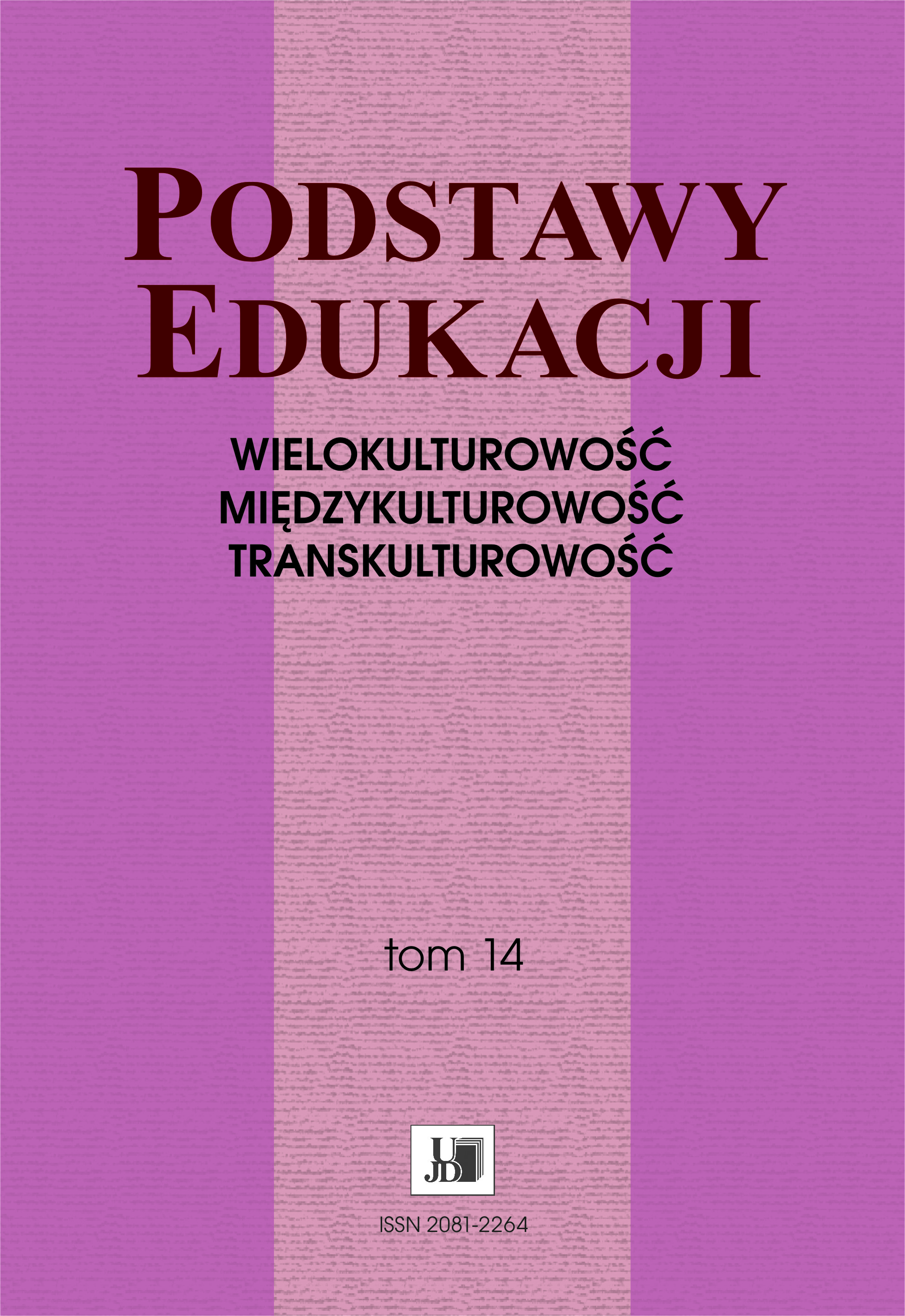Abstract
In the contemporary socio-cultural assumptions, there is a need for the program, which appeared to cultural pluralism and religious among students. This growing awareness of the existing different communities is one of the reasons that education assign a significant role in shaping the
life model based on the interaction of individuals and communities, and entire societies - without
destructive conflicts of national, ethnic, religious or cultural.
The main foundations would be tolerance for attitudes and customs, respect for language, traditions, religions of all students, the mutual enrichment through exchange of values, instilling the
principles of peaceful existence and cooperation in social and cultural opposition to any form of
discrimination, and - apart from learning about their own history and culture – getting to know
the values of other cultures.
Functioning in a culturally diverse environment makes it assume a distinctive lifestyle, behavior
and conduct, drawing from more than one source of culture, assimilating more or less consciously
different values, directly experiencing other cultures and entering into direct interaction with its
representatives. To do this, develop the concept of integral education and pedagogy open, inspired, among others, Christianity. Religious Education is to fill an important humanizing role. It gives a basis to build attitudes of intercultural dialogue and tolerance
References
Biela A.(1989). Ekumenizm w perspektywie badań psychologicznych. W: Z. Chlewiński (red.): Wybrane zagadnienia z psychologii pastoralnej. (s. 189-195). Lublin: Redakcja Wy-dawnictw KUL.
Budniak J. (2004). Ekumenizm W: Leksykon socjologii religii, M. Libiszowska-Żółtkowska, M. Mariański (red.), Warszawa: PWN.
Dąbrowski S. (2000). Degradująca troska (w miejsce degradującej obcości), a nie dialog (cz. 2). Ruch Filozoficzny 2, 251-256 .
Heidtman J. (2005). Integracja społeczna. W: J. Wojnowski, M. Dzikan, K. Gawlas (red.), Wielka Encyklopedia PWN. T. 12, Warszawa: PWN.
Jasiński Z. (2010). Oświata i kultura polonijna a koncepcja wielokulturowości, Studia Migra-cyjne-Przegląd Polonijny 3, 84-88.
Jasiński Z. (2006). Przemiany w polityce oświatowej i społecznej w kontekście edukacji mię-dzykulturowej. W: T. Lewowicki, E. Ogrodzka-Mazur (red.), Z teorii i praktyki edukacji mię-dzykulturowej. (s. 39-46). Cieszyn – Warszawa: WSP.
Król J.(1999). Psychologiczne aspekty badania fenomenu religii. Podstawy teoretyczno-metodologiczne, Opole: WSP.
Lewowicki T. (2001). O ideach oraz praktykach edukacji wielokulturowej i międzykulturowej. Ruch Pedagogiczny 1-2, 5-9.
Nikitorowicz J. (2000). Tolerancja jako wartość w pracy nauczyciela w społeczeństwie wielo-kulturowym. Chowanna 2, 58-66.
Nikitorowicz J. (2009) Człowiek pogranicza jako efekt dialogu tożsamościowego w warun-kach wielokulturowości. Edukacja 3, 12-18.
Olbrycht K. (2002). Rola wychowania religijnego w wychowaniu międzykulturowym. W: T. Lewowicki, A. Różańska, U. Klajmon (red.), Kwestie wyznaniowe w społecznościach wielo-kulturowych. Cieszyn, (s. 209-219). Toruń: Wyd. Marszałek.
Olbrycht K. (2002). Rola edukacji religijnej i wychowania religijnego na początku trzeciego tysiąclecia. Paedagogia Christiana 2, 38-43.
Simonides D.(1990). Folklor a tożsamość Śląska. W: D. Warzecha (red.): Kultura ludowa a tożsamość Śląska. Materiały z sesji naukowej zorganizowanej z okazji II Śląskich Dni Folkloru. Rozprawy i studia Muzeum Śląskiego. T. I. (19-29). Katowice: Muzeum Śląskie.
Słowik R. (2003). Odpowiedzialność za jedność Kościoła w świetle adhortacji apostolskich Jana Pawła II. Roczniki Teologiczne 7, 110-117.
Szewetowska K. (2008). Tolerancja jako treść w procesach socjalizacji i wychowania. Eduka-cja i Dialog 12, 41-46.
Wojak T.( 1995). Zarys historii Kościoła. Bielsko-Biała: ATH.

This work is licensed under a Creative Commons Attribution 4.0 International License.
Copyright (c) 2021 Podstawy Edukacji
